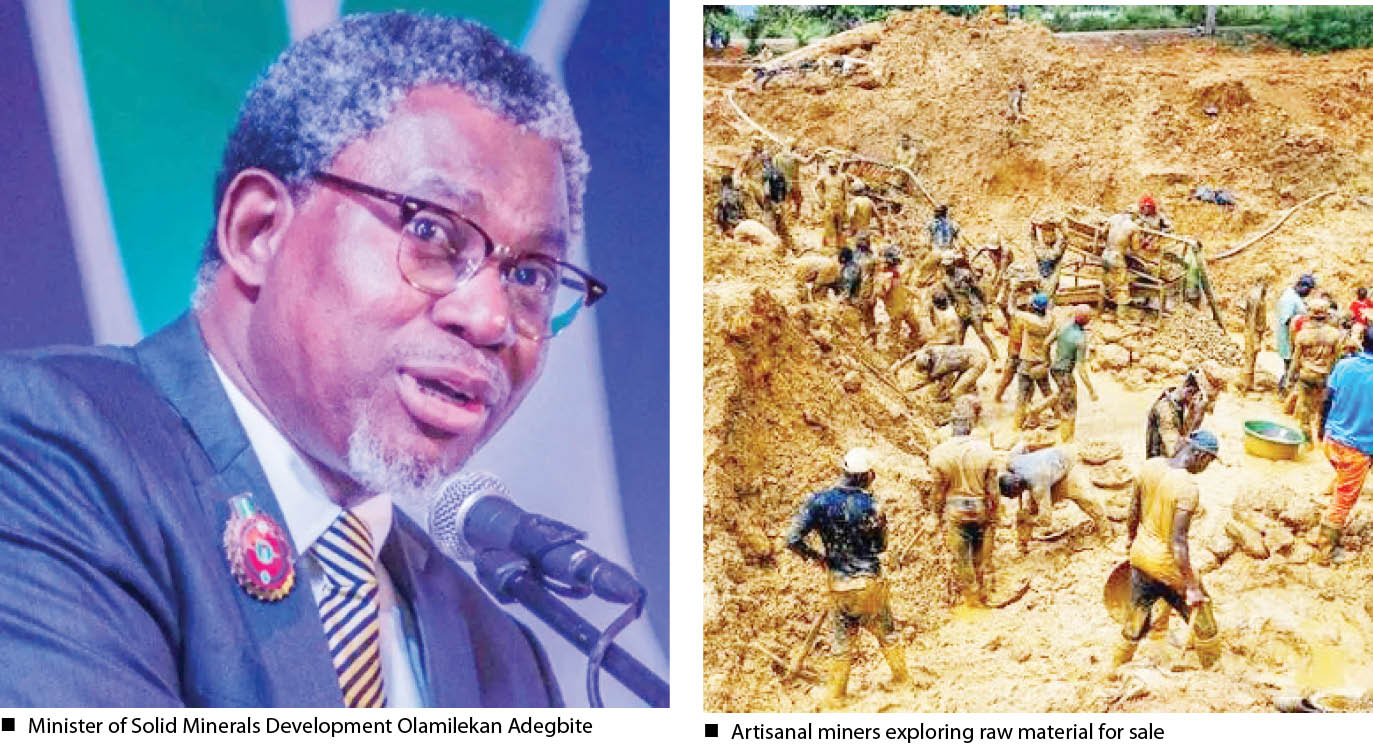The Federal Executive Council on Wednesday approved Nigeria’s Mineral Value Chain Regulations, 2021. The main objective is to protect the mining sector and boost the country’s revenue drive through the development of raw materials into refined products before export.
Highlights of the document include regulating the handling of exploitation, extraction and management of solid minerals in order to integrate it into the overall strategy of Nigeria’s economic development.
Despite global disruptions, Nigerian stock market rakes in N831bn in 6 months
2 civil servants face jail as ‘yahoo yahoo’ suspects ‘jump bail’
The regulation will also seek to ensure the production of solid minerals in a fair and transparent manner to enhance the equitable distribution of mineral wealth to serve the common good.
It will also promote the safe exploitation of solid minerals in an environmentally sustainable way.
It will further ensure “The promotion of employment generation with a focus on harnessing the current crude ore production export of about 70 million metric tons by artisanal miners.
“The strategy seeks to advance development through the optimisation of linkages in the mineral value chain, facilitation of economic diversification, job creation and industrialisation,’’ the document stated.
The Minister of Mines and Steel Development, Olamilekan Adegbite, who briefed journalists shortly after the council’s approval, said the regulation would diversify the country’s economy accelerate industrialisation and create more jobs.
He noted that Nigeria, which has an abundant and varieties of natural resources, is still importing finished products often at a higher cost.
Adegbite said, with this regulation, the country would take full advantage of its huge solid minerals reserves to become self-reliant and increase its revenue generation.
This, according to him, will also expand the entrepreneurial opportunities of artisanal miners and curb insecurity in the mining sector.
“As we started this policy and this regulation essentially, what we’re saying is that we do not want raw materials to be exported from Nigeria.
“For instance, we have Kaolin in Nigeria. What is done normally is that our miners would export raw Kaolin abroad then the end users in Nigeria, that is the pharmaceutical companies, the cosmetic industry and the paint industry, would now import this semi-process Kaolin for their own use in their factory.
“Of course, that is a waste of foreign exchange and also in the process, we export our jobs out there, and therefore lose a lot of value.
“So, if we’re able to process the raw materials, we’ll have the value locally, we’ll keep the jobs, we’ll create wealth for our people, which is what this policy is all about,” he explained.
He lamented that miners, who export the minerals in a raw form, are incurring heavy losses in some countries. “At times they would export a container of 50 tonnes of raw lead and zinc but when it gets to China, they will tell them that it’s only 10 tonnes of refined lead, and there is nothing they can do.
“But, when you process the lead zinc in Nigeria and eliminate all the wastes, remove all materials that are not needed, you’ll send 50 tonnes of lead and they will buy exactly 50 tonnes and get the full value of your product, no doubt about that.
“Essentially, this is what the policy is all about,” he said.
Adegbite further said the regulation would open a new line of business for people who do not want to engage in mining to venture into processing.
“They can go to a cluster where the mining activities are taking place and liaise with artisanal miners who don’t have the capability to process, buy the raw materials from them, process and export or sell locally.
“Also, the miners can pay for the processing and by doing so, more jobs will be created for our people. So, as small as it looks, it is a giant step. In the future, this will translate into many big industries and the minerals in Nigeria would be processed to be used locally or exported” he said.
The minister also noted that there is a downstream policy in place that will prevent the exportation of raw minerals.
He said the ministry has invested its post COVID funds given to it by the federal government to build demonstration projects in different parts of the country in order to facilitate the implementation of the policy.
“As it’s now, we are building a processing plant in Bauchi for kaolin, we are building a processing plant in Ebonyi for lead, and there is another processing plant for barite in Cross River State and another gold processing plant in Kogi State. We also have processing plants in Kano and Ibadan. We have covered all the six geopolitical zones.” he said.
He called on investors to come into the sector and support the project, saying the government cannot do it alone.
However, other stakeholders have expressed reservations over the decision saying Nigeria’s mining sector is too young to entertain some of the regulations.
“For me, it’s not a priority for Nigeria because there are some minerals we can’t process here like lead and zinc. We don’t have a smelter to process these minerals into pure metals.
“So, it’s cheaper to sell the materials raw to the Chinese market and any attempt to compel miners to process it in Nigeria is like killing the sector because it’s not an easy investment,” one of the miners said
He said that Nigeria has no option but to sell these materials raw until dozens of mining industries are localised in the country to invest in the smelter.
Prof Ibrahim Garba, a renowned Geologist and former Vice Chancellor, Ahmadu Bello University Zaria, said it was not a new policy because there was already a similar one in place.
He said he had read the highlights of the proposed strategy but there was nothing new in it and it was totally oblivious of the current situation in the Nigerian mining industry.
He said the sector is premature to be confronted with the compulsion of value addition. “I saw a figure of 70 million tons of production by artisanal miners and one would ask the production of what?
“Where is the record of this mineral production and where are the mines? Much of the highlights also are already contained in the Nigerian Minerals & Mining Act (2007) and Regulations of (2011).
“The statements are all either duplicating the provisions of the existing Act and Regulations or are totally misplaced, given the current state of the sector in Nigeria. The ministry will be better off implementing and enforcing the provisions of the extant laws to promote significant mineral production before contemplating additional regulatory framework that may end up bringing confusion in the sector” he added.
“Yes, some minerals like kaolin, which has a local market, can be processed to the industrial grade but the investment can be quite huge and without assurance of banning the importation of the processed mineral that may not be profitable.
“What normally the ministry should do is to convince the government to ban the importation or place heavy import tariff to force the industries to resort to local sourcing.
“This should only be applicable to industrial minerals that can replace the imports and are not suitable for export because of their low value, high volume nature.
“Metallic minerals like lead-zinc, tin, gold, etc would require smelting to produce the high purity metals (ingots) and the investment in refineries is so huge that there are normally few even around the world.
“For example, the nearest smelter to Nigeria is in South Africa. Besides, such very expensive smelters require huge volumes of minerals concentrates produced from mines, which at the moment are not available in Nigeria” he said.

 Join Daily Trust WhatsApp Community For Quick Access To News and Happenings Around You.
Join Daily Trust WhatsApp Community For Quick Access To News and Happenings Around You.


